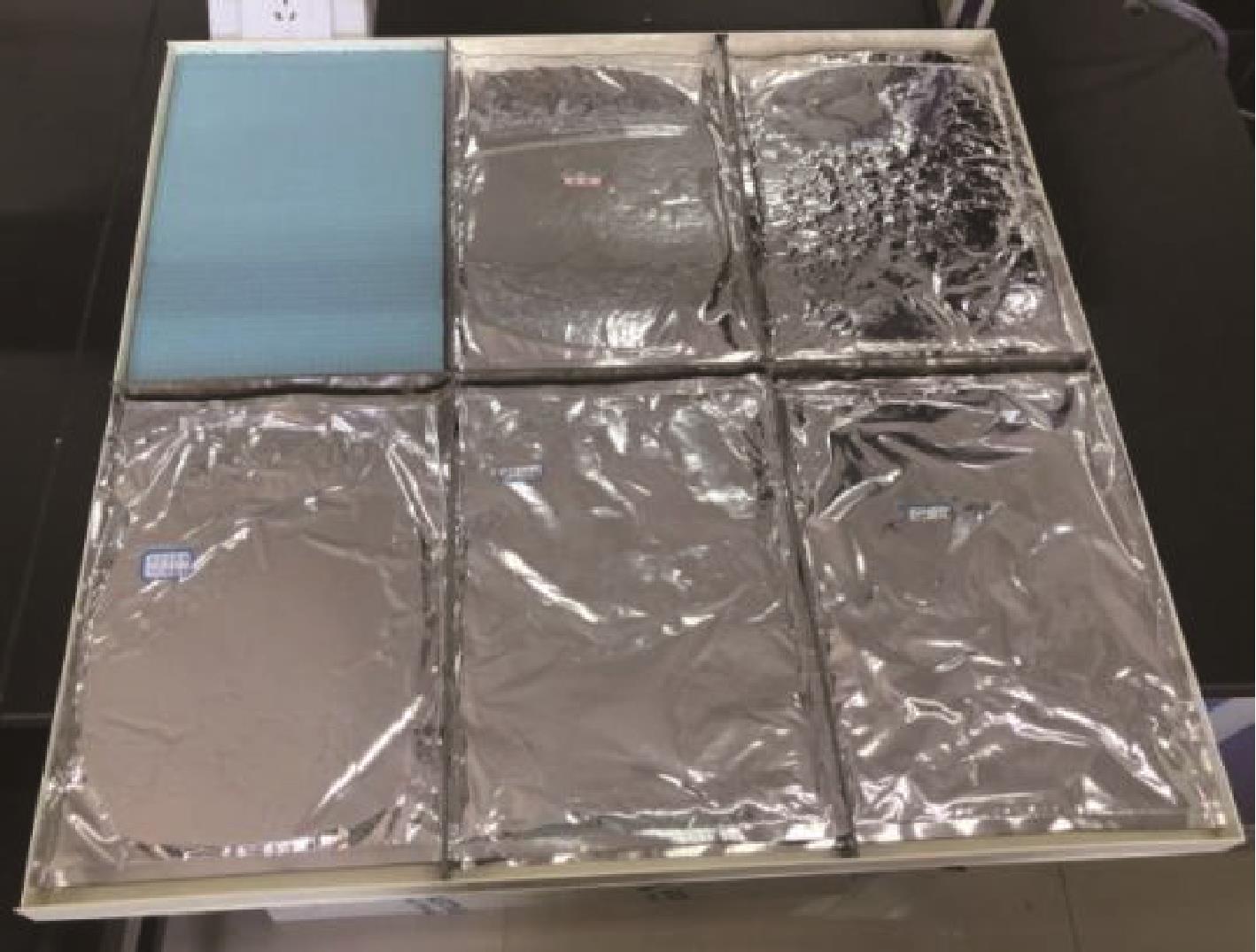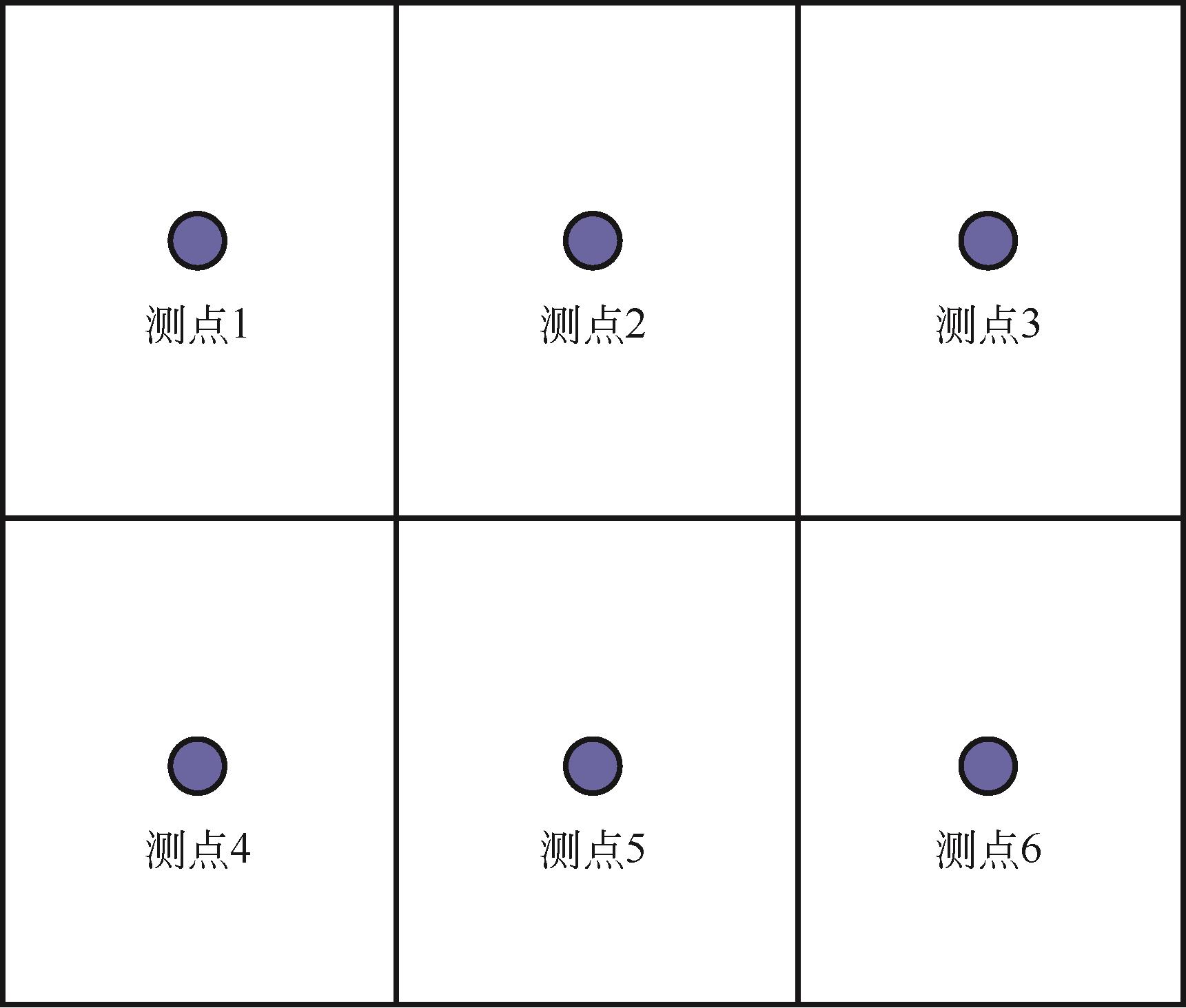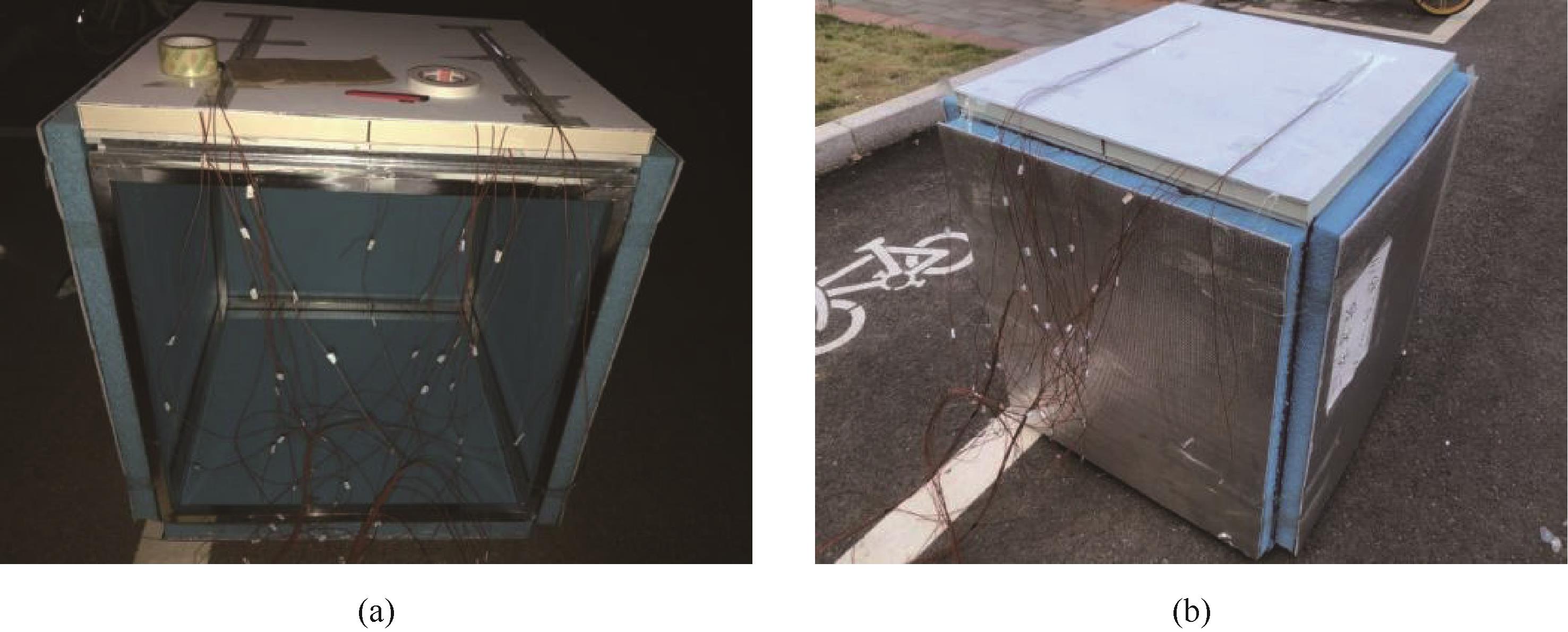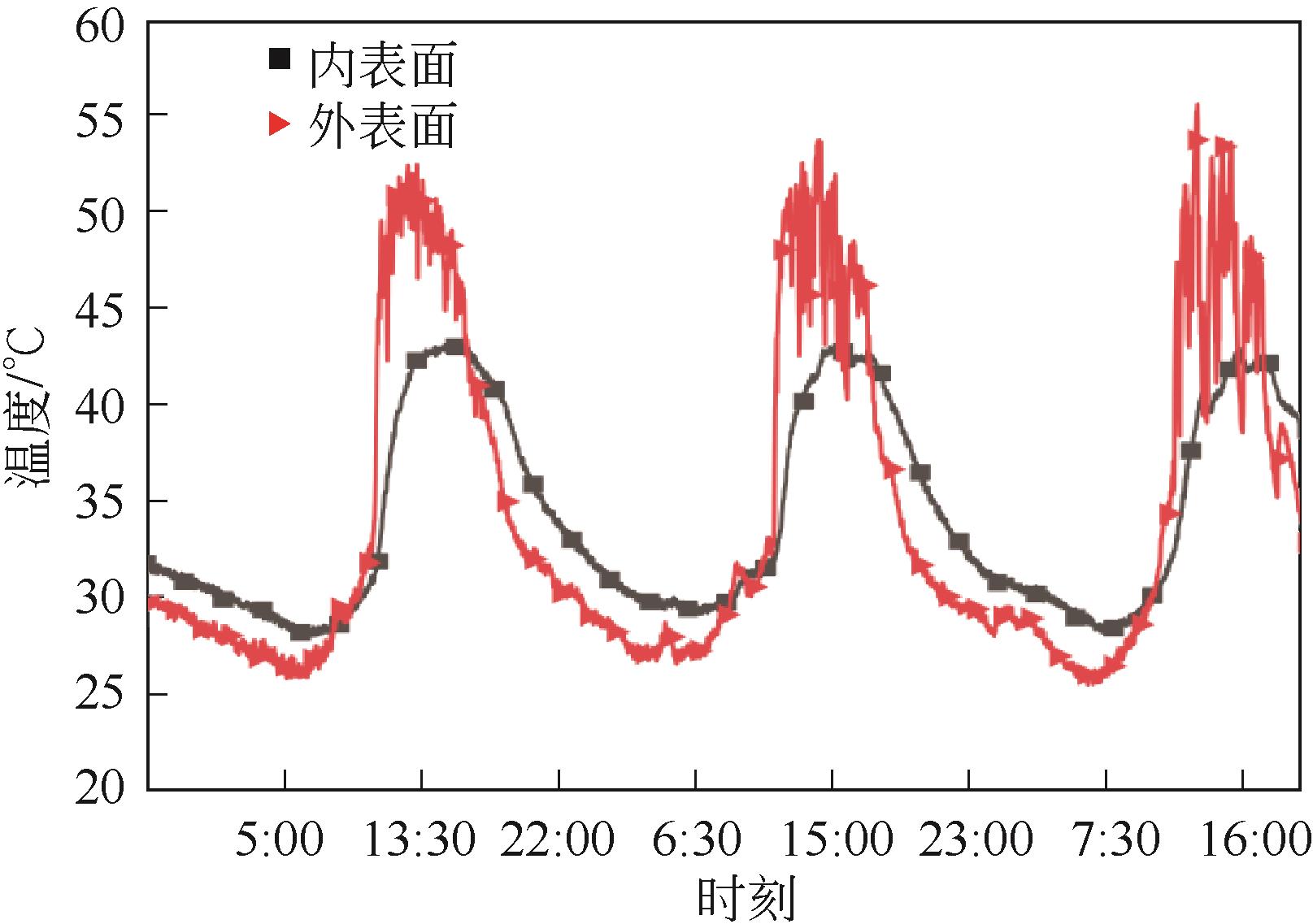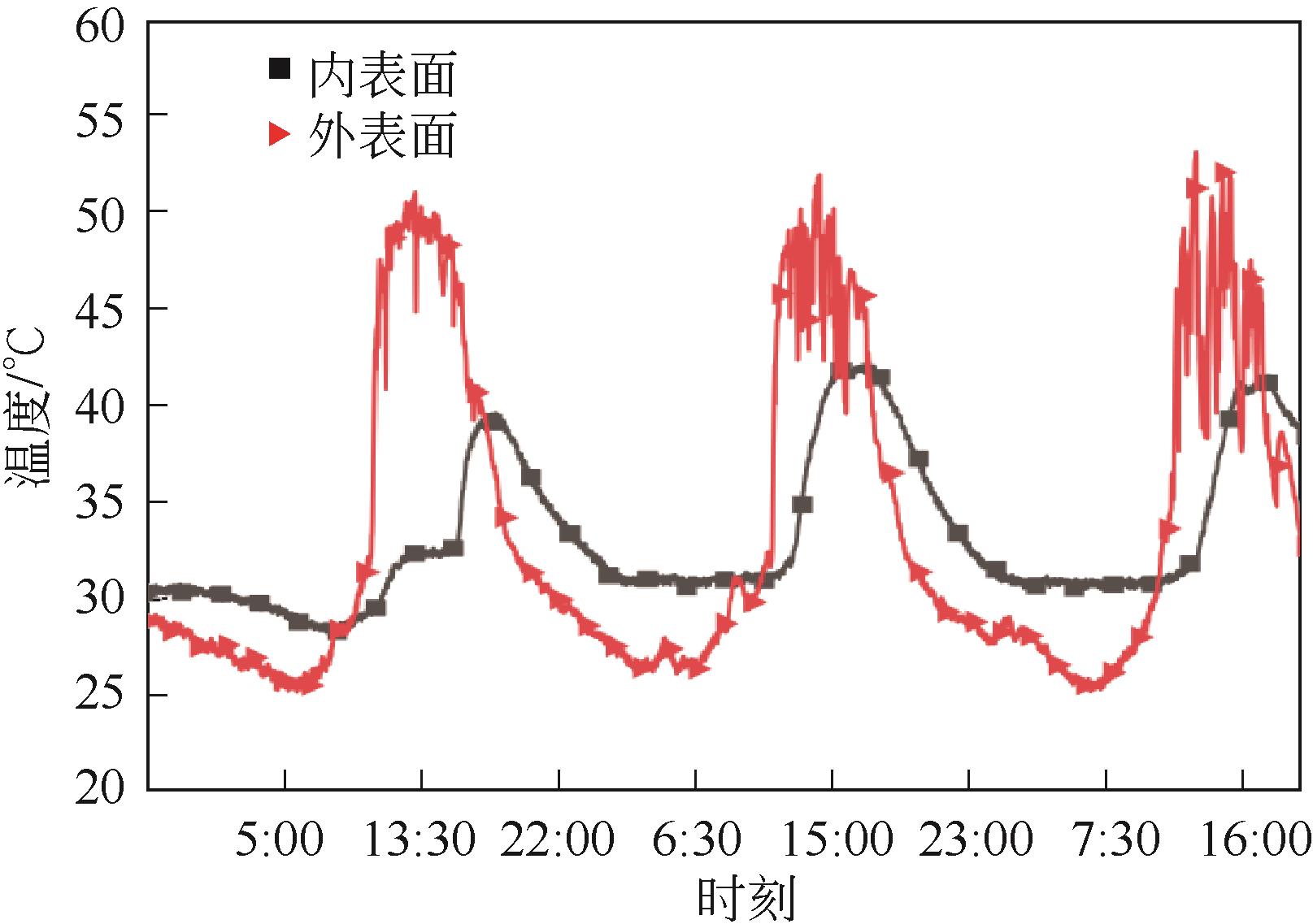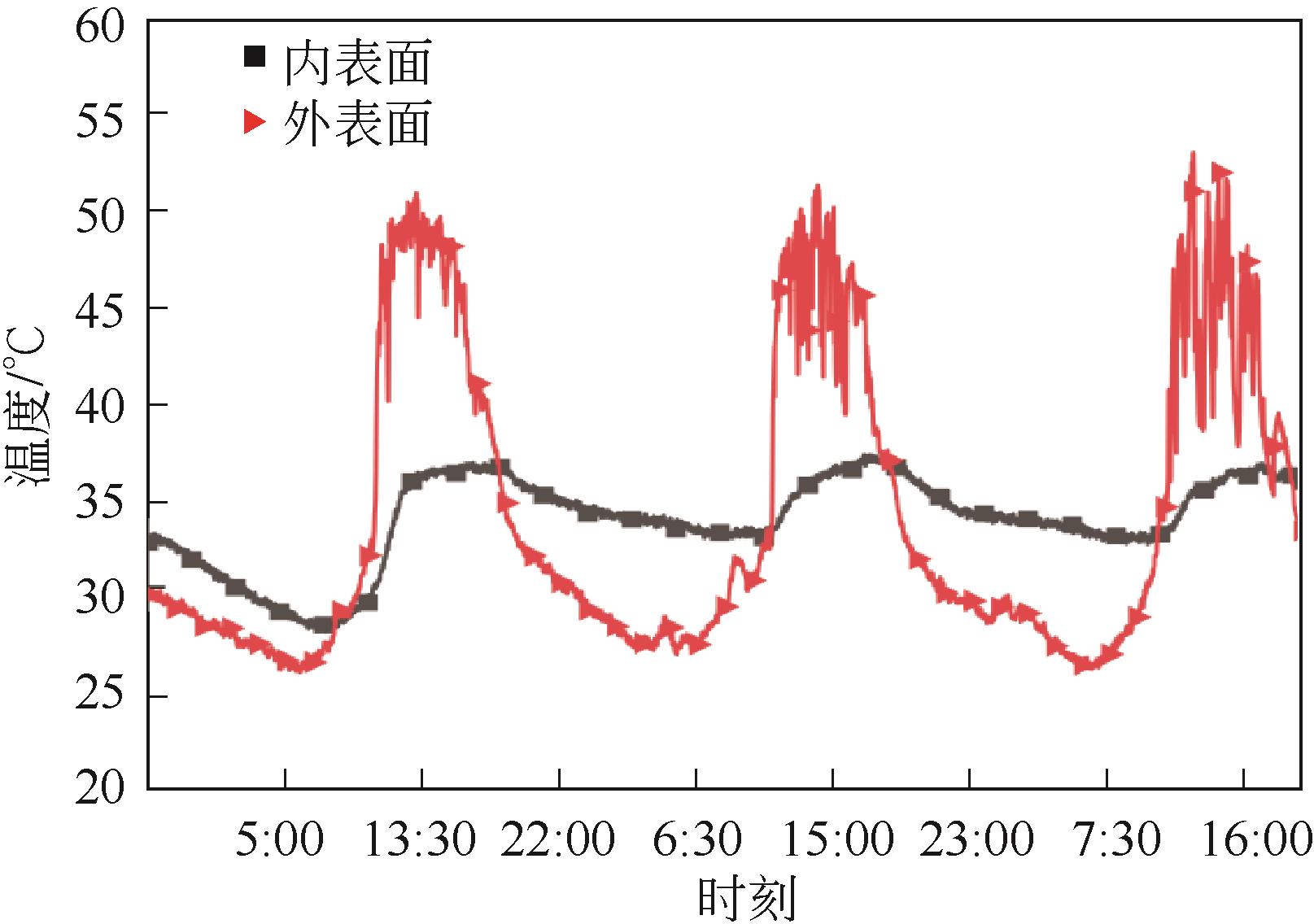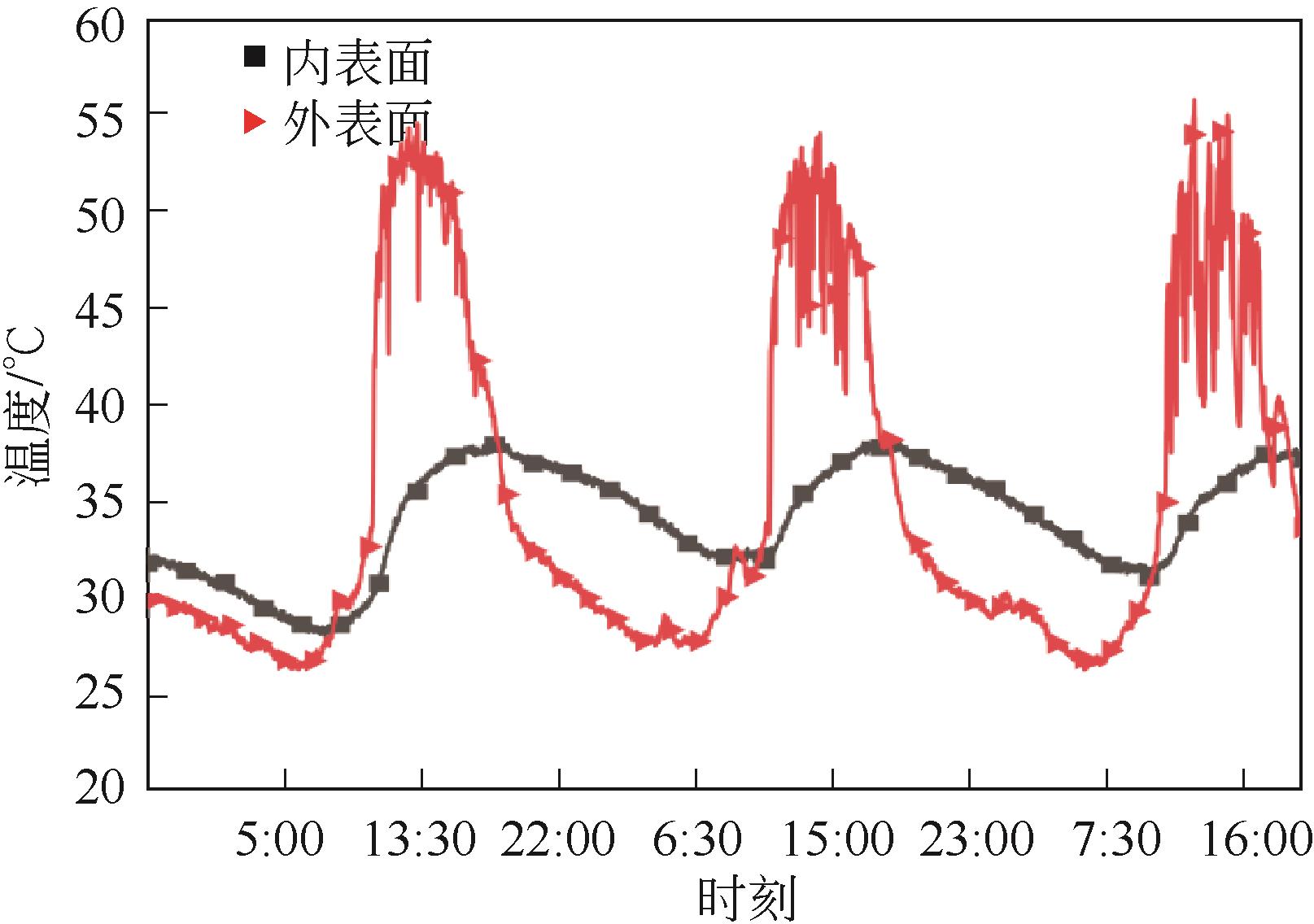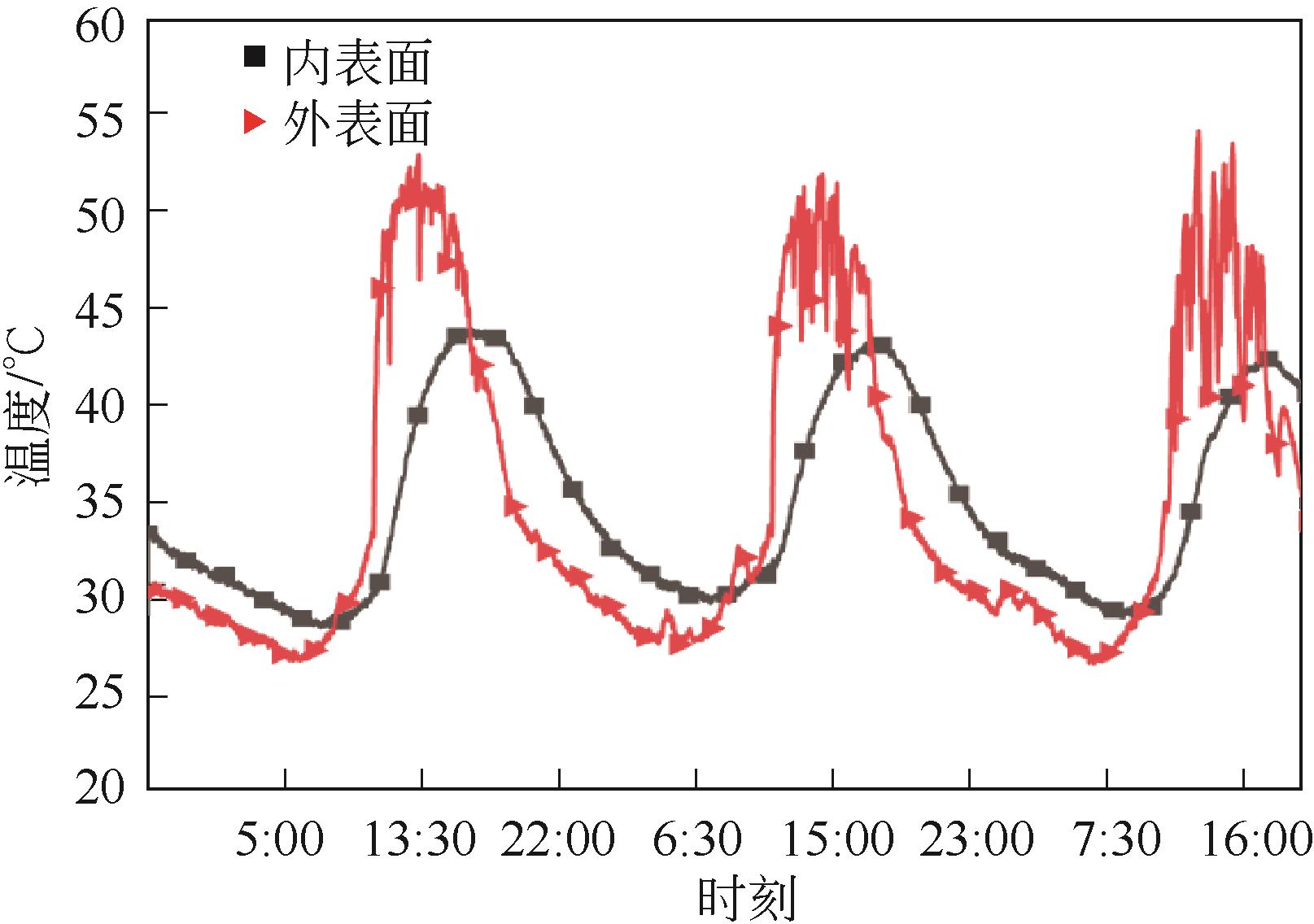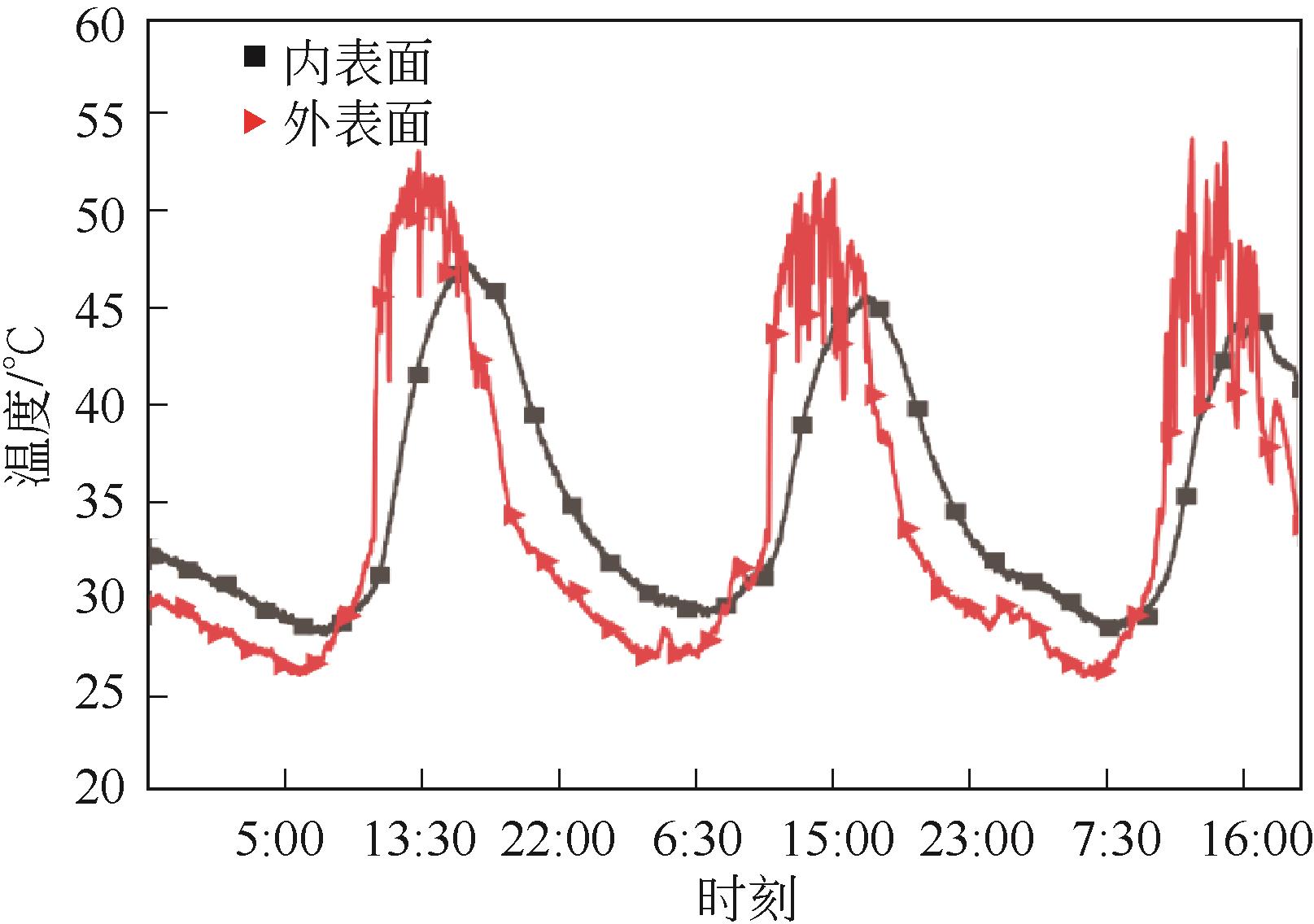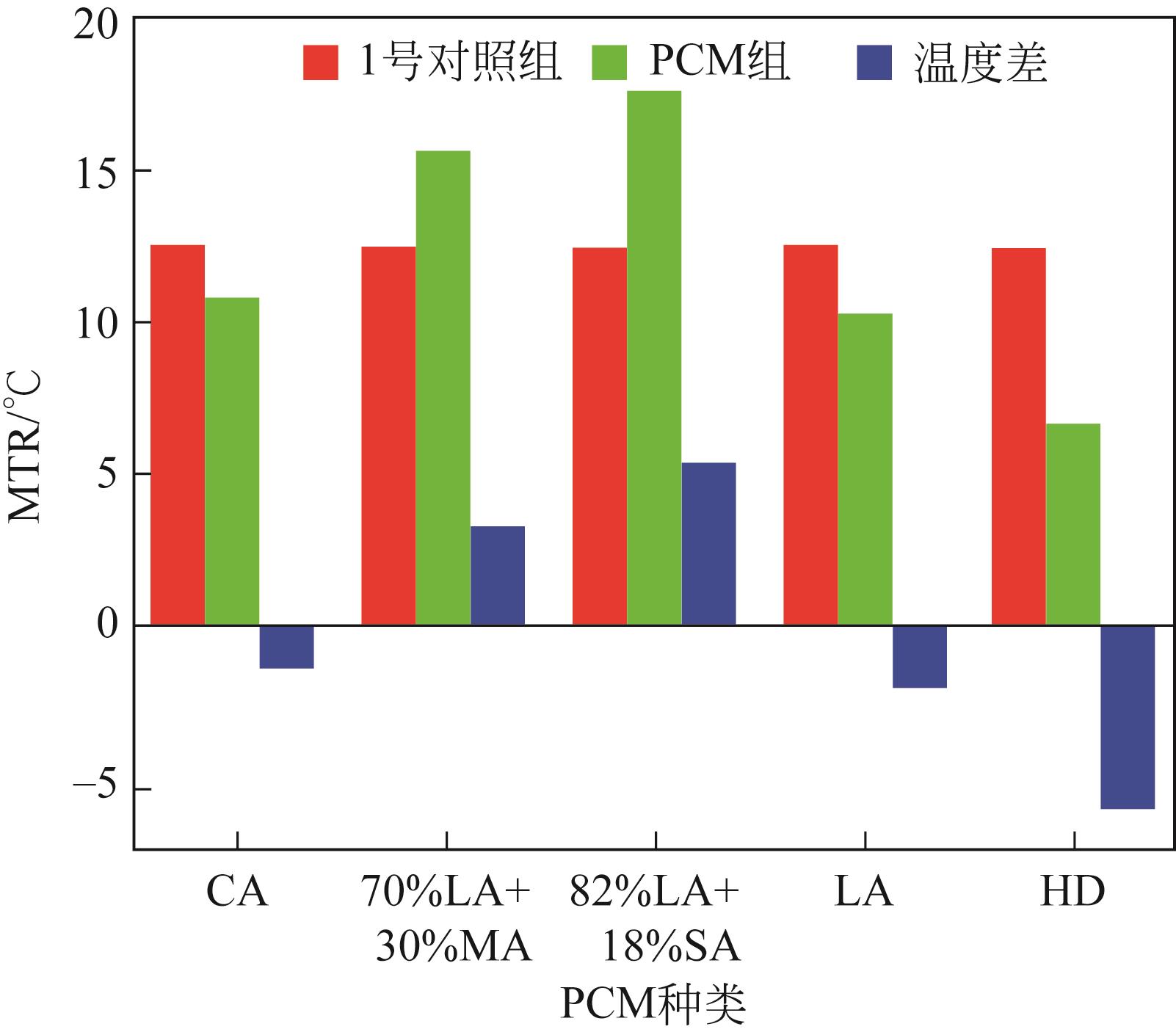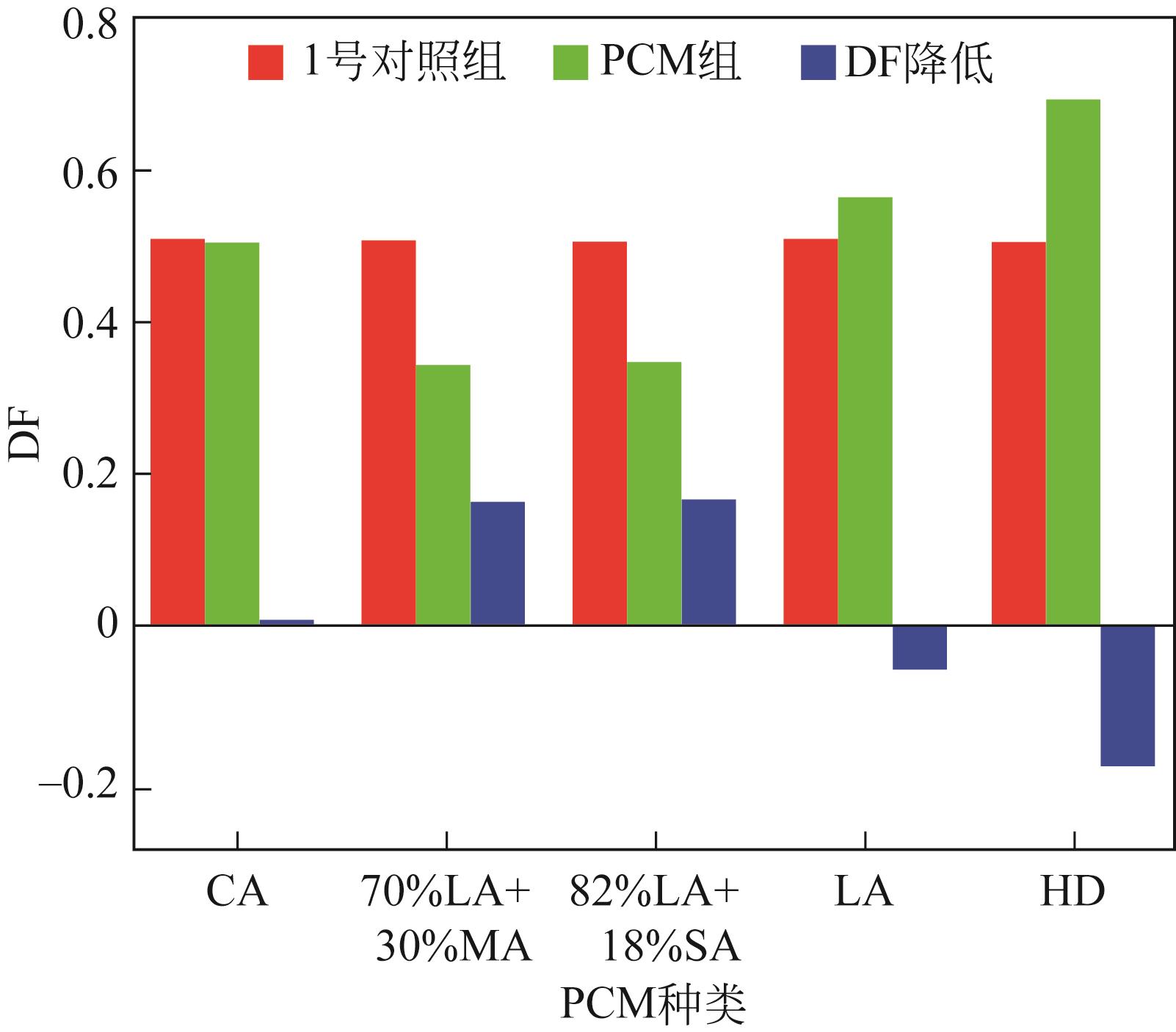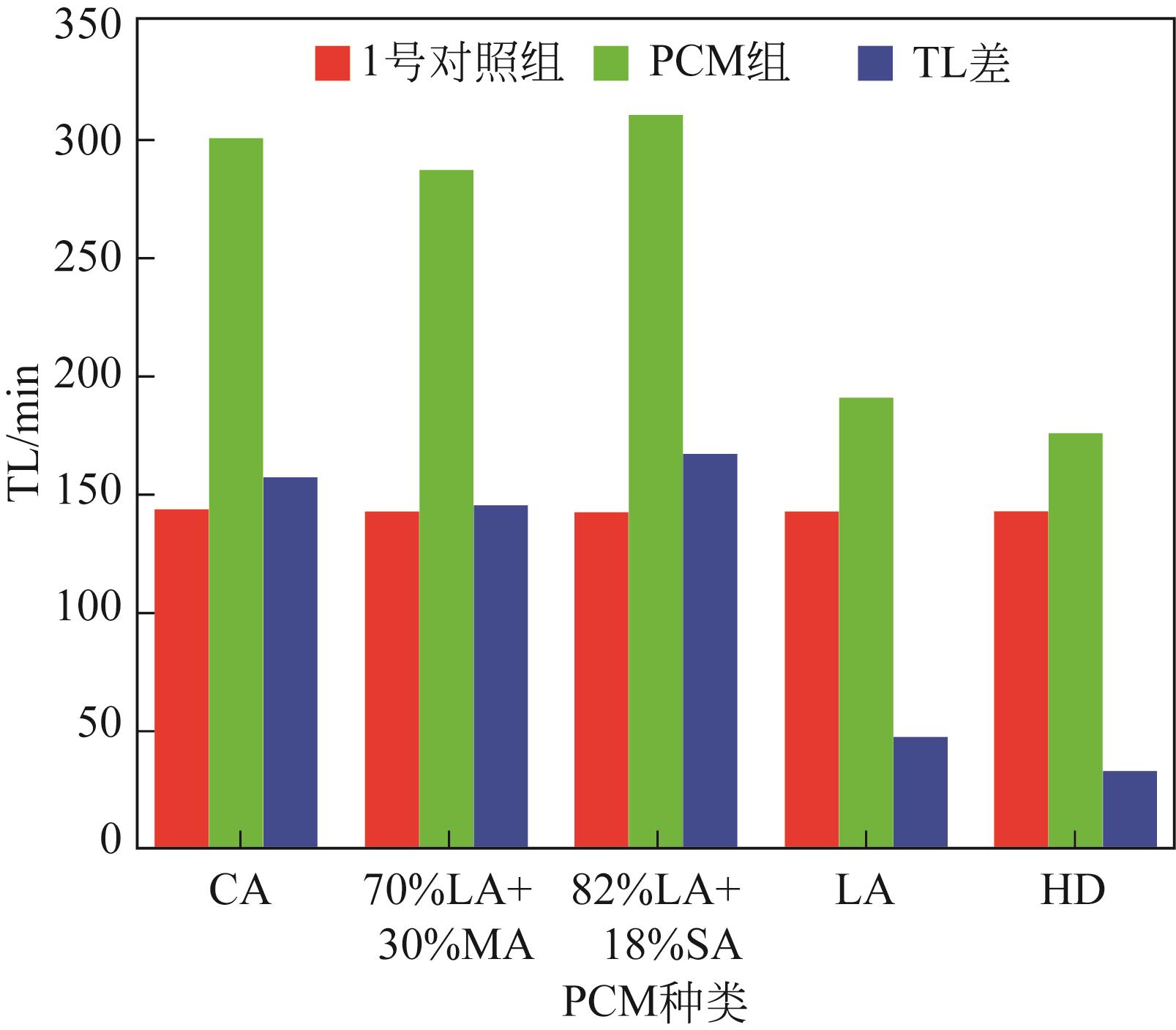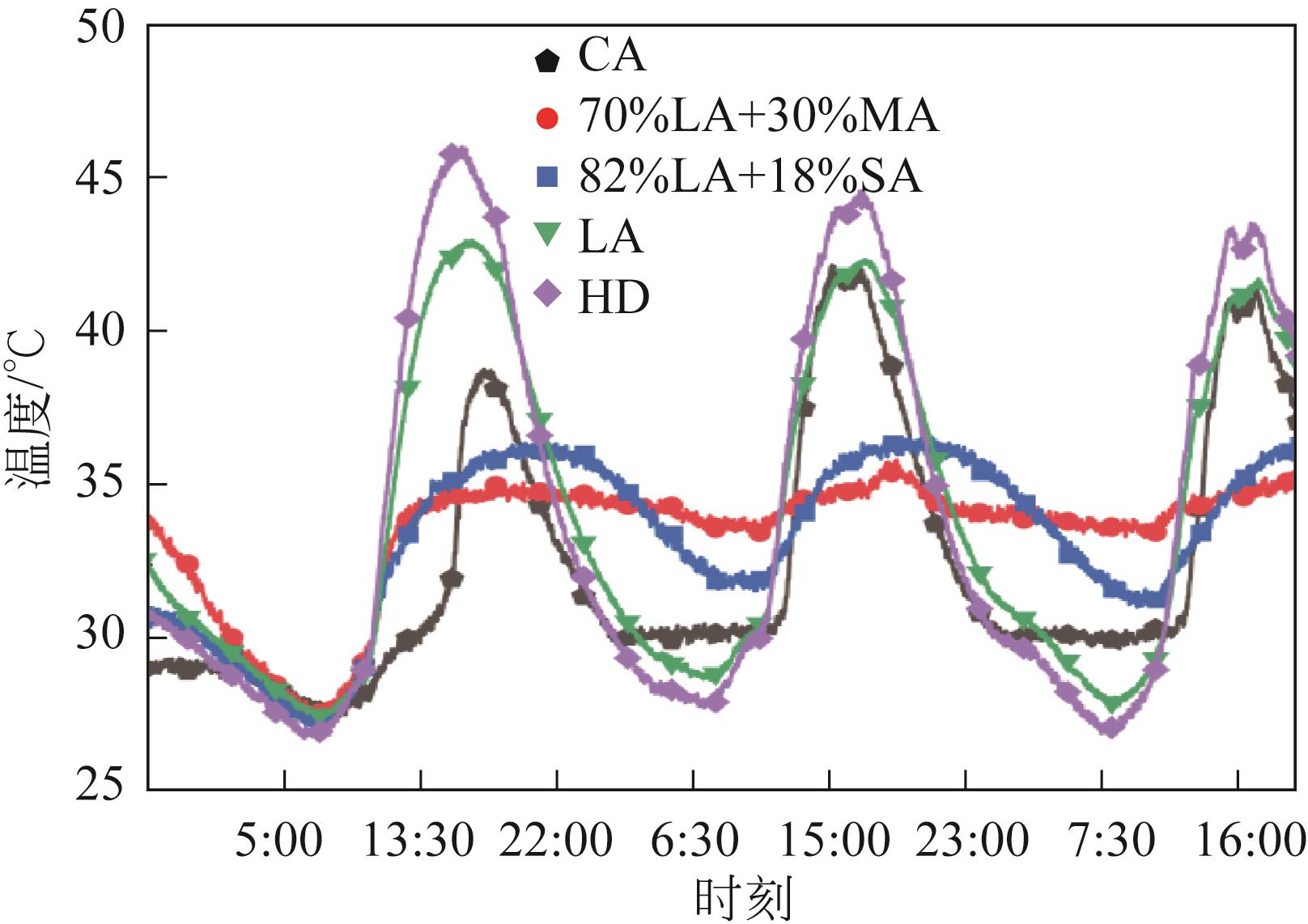Chemical Industry and Engineering Progress ›› 2023, Vol. 42 ›› Issue (9): 4828-4836.DOI: 10.16085/j.issn.1000-6613.2022-1910
• Materials science and technology • Previous Articles Next Articles
Experimental study on the optimum phase change temperature of phase change roofs in hot summer and cold winter areas
SHI Yu( ), ZHAO Yunchao(
), ZHAO Yunchao( ), FAN Zhixuan, JIANG Dahua
), FAN Zhixuan, JIANG Dahua
- School of Civil Engineering and Surveying and Mapping Engineering, Jiangxi University of Science and Technology, Ganzhou 34100, Jiangxi, China
-
Received:2022-10-14Revised:2022-11-21Online:2023-09-28Published:2023-09-15 -
Contact:ZHAO Yunchao
夏热冬冷地区相变屋面最佳相变温度的实验研究
- 江西理工大学土木与测绘工程学院,江西 赣州 341000
-
通讯作者:赵运超 -
作者简介:时雨(1997—),女,硕士研究生,研究方向建筑节能技术。E-mail:3052377642@qq.com。 -
基金资助:江西省教育厅科学技术研究项目(GJJ200830);江西理工大学高层次人才科研启动项目(2021205200100553)
CLC Number:
Cite this article
SHI Yu, ZHAO Yunchao, FAN Zhixuan, JIANG Dahua. Experimental study on the optimum phase change temperature of phase change roofs in hot summer and cold winter areas[J]. Chemical Industry and Engineering Progress, 2023, 42(9): 4828-4836.
时雨, 赵运超, 樊智轩, 蒋达华. 夏热冬冷地区相变屋面最佳相变温度的实验研究[J]. 化工进展, 2023, 42(9): 4828-4836.
share this article
Add to citation manager EndNote|Ris|BibTeX
URL: https://hgjz.cip.com.cn/EN/10.16085/j.issn.1000-6613.2022-1910
| 材料 | 厚度/m | 相变温度/K | 密度/kg·m-2 | 潜热/J·g-1 | 热导率/W·m-1·K-1 |
|---|---|---|---|---|---|
| 彩钢板 | 0.03 | — | 7850.00 | — | 48.00 |
| 铝合金板 | 0.02 | — | 2730.00 | — | 238.00 |
| 反射隔热涂料 | 0.002 | — | 15.00 | — | — |
| XPS隔热板 | 0.02 | — | 35.00 | — | 0.03 |
| 癸酸 | 0.02 | 304.15 | 885.80 | 141.83 | 0.30 |
| 70% 月桂酸+30% 肉豆蔻 | 0.02 | 308.15 | — | 166.18 | — |
| 82% 月桂酸+18% 硬脂酸 | 0.02 | 312.15 | — | 189.50 | — |
| 月桂酸 | 0.02 | 316.15 | 883.00 | 166.67 | 0.21 |
| 十六醇 | 0.02 | 321.15 | 817.60 | 241.00 | 0.20 |
| 材料 | 厚度/m | 相变温度/K | 密度/kg·m-2 | 潜热/J·g-1 | 热导率/W·m-1·K-1 |
|---|---|---|---|---|---|
| 彩钢板 | 0.03 | — | 7850.00 | — | 48.00 |
| 铝合金板 | 0.02 | — | 2730.00 | — | 238.00 |
| 反射隔热涂料 | 0.002 | — | 15.00 | — | — |
| XPS隔热板 | 0.02 | — | 35.00 | — | 0.03 |
| 癸酸 | 0.02 | 304.15 | 885.80 | 141.83 | 0.30 |
| 70% 月桂酸+30% 肉豆蔻 | 0.02 | 308.15 | — | 166.18 | — |
| 82% 月桂酸+18% 硬脂酸 | 0.02 | 312.15 | — | 189.50 | — |
| 月桂酸 | 0.02 | 316.15 | 883.00 | 166.67 | 0.21 |
| 十六醇 | 0.02 | 321.15 | 817.60 | 241.00 | 0.20 |
| 名称 | 型号 | 规格 | 厂家 |
|---|---|---|---|
| 电子天平 | JA2003 | 精度±0.001g | 上海良平仪器仪表有限公司 |
| 磁力搅拌器 | DF-101S | — | 巩义市予华仪器有限责任公司 |
| 恒温恒湿培养箱 | HWS-250B | — | 北京市恒诺利兴科技有限公司 |
| 多路巡回检测仪 | THJ082K | ±0.5%FS | 余姚市腾辉温控仪表厂 |
| Agilent数据采集仪 | 34972A | 精度±0.001℃ | KEYSIGHT |
| 名称 | 型号 | 规格 | 厂家 |
|---|---|---|---|
| 电子天平 | JA2003 | 精度±0.001g | 上海良平仪器仪表有限公司 |
| 磁力搅拌器 | DF-101S | — | 巩义市予华仪器有限责任公司 |
| 恒温恒湿培养箱 | HWS-250B | — | 北京市恒诺利兴科技有限公司 |
| 多路巡回检测仪 | THJ082K | ±0.5%FS | 余姚市腾辉温控仪表厂 |
| Agilent数据采集仪 | 34972A | 精度±0.001℃ | KEYSIGHT |
| 温度 | 1号 | 2号 | 3号 | 4号 | 5号 | 6号 |
|---|---|---|---|---|---|---|
| 最低温度 | 25.42 | 25.23 | 25.59 | 25.72 | 25.84 | 25.26 |
| 最高温度 | 55.54 | 53.12 | 52.47 | 55.21 | 53.73 | 53.06 |
| 平均温度 | 34.19 | 33.56 | 33.65 | 34.57 | 34.38 | 33.84 |
| 温度 | 1号 | 2号 | 3号 | 4号 | 5号 | 6号 |
|---|---|---|---|---|---|---|
| 最低温度 | 25.42 | 25.23 | 25.59 | 25.72 | 25.84 | 25.26 |
| 最高温度 | 55.54 | 53.12 | 52.47 | 55.21 | 53.73 | 53.06 |
| 平均温度 | 34.19 | 33.56 | 33.65 | 34.57 | 34.38 | 33.84 |
| 温度 | 1号 | 2号 | 3号 | 4号 | 5号 | 6号 |
|---|---|---|---|---|---|---|
| 最低温度 | 27.94 | 28.28 | 27.69 | 27.51 | 27.76 | 27.40 |
| 最高温度 | 43.14 | 42.28 | 36.85 | 37.57 | 43.41 | 46.67 |
| 平均温度 | 34.15 | 33.31 | 33.48 | 33.55 | 34.21 | 34.43 |
| 温度 | 1号 | 2号 | 3号 | 4号 | 5号 | 6号 |
|---|---|---|---|---|---|---|
| 最低温度 | 27.94 | 28.28 | 27.69 | 27.51 | 27.76 | 27.40 |
| 最高温度 | 43.14 | 42.28 | 36.85 | 37.57 | 43.41 | 46.67 |
| 平均温度 | 34.15 | 33.31 | 33.48 | 33.55 | 34.21 | 34.43 |
| 温度 | 1号 | 2号 | 3号 | 4号 | 5号 | 6号 |
|---|---|---|---|---|---|---|
| 最高降温 | 16.19 | 21.19 | 17.58 | 21.2 | 18.44 | 16.74 |
| 平均降温 | 5.58 | 10.10 | 7.86 | 10.01 | 7.66 | 6.45 |
| 温度 | 1号 | 2号 | 3号 | 4号 | 5号 | 6号 |
|---|---|---|---|---|---|---|
| 最高降温 | 16.19 | 21.19 | 17.58 | 21.2 | 18.44 | 16.74 |
| 平均降温 | 5.58 | 10.10 | 7.86 | 10.01 | 7.66 | 6.45 |
| 1 | IEA (International Energy Agency), Environment Programme UN. 2019 Global Status Report for Buildings and Construction: towards Zero-Emission, Efficient and Resilient Buildings and Construction Sector[R]. 2019. |
| 2 | 赵东来, 胡春雨, 柏德胜, 等. 我国建筑节能技术现状与发展趋势[J]. 建筑节能, 2015, 43(3): 116-121. |
| ZHAO Donglai, HU Chunyu, BAI Desheng, et al. Building energy conservation technology status and development trend in China[J]. Building Energy Efficiency, 2015, 43(3): 116-121. | |
| 3 | YAO Chengqiang, KONG Xiangfei, LI Yantong, et al. Numerical and experimental research of cold storage for a novel expanded perlite-based shape-stabilized phase change material wallboard used in building[J]. Energy Conversion and Management, 2018, 155: 20-31. |
| 4 | MENG Erlin, YU Hang, ZHOU Bo. Study of the thermal behavior of the composite phase change material (PCM) room in summer and winter[J]. Applied Thermal Engineering, 2017, 126: 212-225. |
| 5 | VIJAYKUMAR K C K, SRINIVASAN P S S, DHANDAPANI S. A performance of hollow clay tile (HCT) laid reinforced cement concrete (RCC) roof for tropical summer climates[J]. Energy and Buildings, 2007, 39(8): 886-892. |
| 6 | LI Dong, ZHENG Yumeng, LIU Changyu, et al. Numerical analysis on thermal performance of roof contained PCM of a single residential building[J]. Energy Conversion and Management, 2015, 100: 147-156. |
| 7 | YU Jinghua, YANG Qingchen, YE Hong, et al. Thermal performance evaluation and optimal design of building roof with outer-layer shape-stabilized PCM[J]. Renewable Energy, 2020, 145: 2538-2549. |
| 8 | YAN Quanying. An applied research on phase-change materical building mass[C]. Proceedings of the 3th International Symposium on Heat Transfer and Energy Conservation. Guangzhou:South China University of Technology Press, 2004. |
| 9 | 杨清晨, 于靖华, 陶俊威, 等. 相变屋面隔热性能影响因素分析[J]. 建筑科学, 2019, 35(4): 15-21. |
| YANG Qingchen, YU Jinghua, TAO Junwei, et al. Analysis of factors affecting thermal insulation performance of phase change roof[J]. Building Science, 2019, 35(4): 15-21. | |
| 10 | SYNNEFA A, SANTAMOURIS M, AKBARI H. Estimating the effect of using cool coatings on energy loads and thermal comfort in residential buildings in various climatic conditions[J]. Energy and Buildings, 2007, 39(11): 1167-1174. |
| 11 | TRIANO-JUÁREZ J, MACIAS-MELO E V, HERNÁNDEZ-PÉREZ I, et al. Thermal behavior of a phase change material in a building roof with and without reflective coating in a warm humid zone[J]. Journal of Building Engineering, 2020, 32: 101648. |
| 12 | SAFFARI Mohammad, PISELLI Cristina, DE GRACIA Alvaro, et al. Thermal stress reduction in cool roof membranes using phase change materials (PCM)[J]. Energy and Buildings, 2018, 158: 1097-1105. |
| 13 | MENG Erlin, WANG Junqi, YU Hang, et al. Experimental study of the thermal protection performance of the high reflectivity-phase change material (PCM) roof in summer[J]. Building and Environment, 2019, 164: 106381. |
| 14 | HASAN Mushtaq I, BASHER Hadi O, SHDHAN Ahmed O. Experimental investigation of phase change materials for insulation of residential buildings[J]. Sustainable Cities and Society, 2018, 36: 42-58. |
| 15 | 杨天润, 孙锲, WENNERSTEN Ronald, 等. 相变蓄冷材料的研究进展[J]. 工程热物理学报, 2018, 39(3): 567-573. |
| YANG Tianrun, SUN Qie, WENNERSTEN Ronald, et al. Review of phase change materials for cold thermal energy storage[J]. Journal of Engineering Thermophysics, 2018, 39(3): 567-573. | |
| 16 | 冷光辉, 蓝志鹏, 葛志伟, 等. 储热材料研究进展[J]. 储能科学与技术, 2015, 4(2): 119-130. |
| LENG Guanghui, LAN Zhipeng, GE Zhiwei, et al. Recent progress in thermal energy storage materials[J]. Energy Storage Science and Technology, 2015, 4(2): 119-130. | |
| 17 | FAN Zhixuan, ZHAO Yunchao, LIU Xuying, et al. Thermal properties and reliabilities of lauric acid-based binary eutectic fatty acid as a phase change material for building energy conservation[J]. ACS Omega, 2022, 7(18): 16097-16108. |
| 18 | Qudama AL-YASIRI, Márta SZABÓ. Experimental evaluation of the optimal position of a macroencapsulated phase change material incorporated composite roof under hot climate conditions[J]. Sustainable Energy Technologies and Assessments, 2021, 45: 101121. |
| 19 | SUN Xiaoqin, FAN Siyuan, CHU Youhong, et al. Annual thermal evaluation of lightweight building envelopes containing phase change materials in Changsha[C]//Environmental Science and Engineering. Singapore: Springer, 2020: 157-166. |
| 20 | KENZHEKHANOV Sultan, MEMON Shazim ALI, ADILKHANOVA Indira. Quantitative evaluation of thermal performance and energy saving potential of the building integrated with PCM in a subarctic climate[J]. Energy, 2020, 192: 116607. |
| 21 | ASAN H. Numerical computation of time lags and decrement factors for different building materials[J]. Building and Environment, 2006, 41(5): 615-620. |
| 22 | MAZZEO Domenico, KONTOLEON Karolos J. The role of inclination and orientation of different building roof typologies on indoor and outdoor environment thermal comfort in Italy and Greece[J]. Sustainable Cities and Society, 2020, 60: 102111. |
| [1] | TANG Lei, ZENG Desen, LING Ziye, ZHANG Zhengguo, FANG Xiaoming. Research progress of phase change materials and their application systems for cool storage [J]. Chemical Industry and Engineering Progress, 2023, 42(8): 4322-4339. |
| [2] | XU Yuzhen, JIANG Dahua, LIU Jingtao, CHEN Pu. Preparation and properties of fly ash based phase change energy storage materials [J]. Chemical Industry and Engineering Progress, 2023, 42(5): 2595-2605. |
| [3] | ZHANG Chenyu, WANG Ning, XU Hongtao, LUO Zhuqing. Performance evaluation of the multiple layer latent heat thermal energy storage unit combined with nanoparticle for heat transfer enhancement [J]. Chemical Industry and Engineering Progress, 2023, 42(5): 2332-2342. |
| [4] | WU Weixiong, XIE Shiwei, MA Ruixin, LIU Jizhen, WANG Shuangfeng, RAO Zhonghao. Research progress of solid-liquid/gas-liquid multiphase coupling thermal control technology [J]. Chemical Industry and Engineering Progress, 2023, 42(3): 1143-1154. |
| [5] | ZHAO Xipo, BIAN Wuxun, RAN Baoqing, LIU Jinchao, YIN Shaoding, SUN Yiming. Preparation and properties of paraffin solid-solid phase change materials [J]. Chemical Industry and Engineering Progress, 2023, 42(2): 897-906. |
| [6] | HAO Xubo, NIU Baolian, GUO Haotian, XU Xianghe, ZHANG Zhongbin, LI Yinglin. Modification of microencapsulated phase change material and its utilization in photothermal conversion [J]. Chemical Industry and Engineering Progress, 2023, 42(2): 854-871. |
| [7] | SUN Yiming, RAN Baoqing, BIAN Wuxun, LIU Jinchao, YIN Shaoding, ZHAO Xipo. Preparation and process optimization of polypropylene wax solid-solid phase change material [J]. Chemical Industry and Engineering Progress, 2023, 42(1): 336-345. |
| [8] | BAI Jingang, YUAN Zhengji, LIU Yu, ZHANG Yishi, LYU Xifeng. Fabrication and thermal properties of decanoic acid-paraffin/graphene aerogel form-stable phase change materials [J]. Chemical Industry and Engineering Progress, 2022, 41(8): 4441-4448. |
| [9] | YANG Yukai, XIA Yongpeng, XU Fen, SUN Lixian, GUAN Yanxun, LIAO Lumin, LI Yaying, ZHOU Tianhao, LAO Jianhao, WANG Yu, WANG Yingjing. Research progress of erythritol phase change materials for thermal storage [J]. Chemical Industry and Engineering Progress, 2022, 41(8): 4357-4366. |
| [10] | ZHANG Chunwei, LI Shanfeng, GUO Yongzhao, ZHANG Xuejun, JIANG Long. Gravity effect on PCM melting process under constant heat flux boundary [J]. Chemical Industry and Engineering Progress, 2022, 41(8): 4129-4139. |
| [11] | GUO Zhi’an, SUI Zhihui, LI Yaping, XU Yikun, SUN Fang, ZHAO Xin. Research progress on preparation technology of phase-change bidirectional temperature-regulating textile materials [J]. Chemical Industry and Engineering Progress, 2022, 41(7): 3648-3659. |
| [12] | ZHU Mengshuai, WANG Zilong, SUN Xiangxin, ZHOU Xiang. Experimental research on effect of copper metal foam proportion on paraffin wax melting and heat transfer mechanism under high cell density [J]. Chemical Industry and Engineering Progress, 2022, 41(6): 3203-3211. |
| [13] | ZHANG Ruirui, WANG Ning, GAO Zhi, YU Xiaohui, YANG Bin. Analysis of supercooling characteristics of erythritol/mannitol [J]. Chemical Industry and Engineering Progress, 2022, 41(6): 2959-2966. |
| [14] | LU Shaofeng, CUI Shanshan, SHI Wenzhao, LI Susong, XIE Yan, YANG Qiancheng. Preparation and properties of cross-linked waterborne polyurethane solid-solid phase change material [J]. Chemical Industry and Engineering Progress, 2022, 41(5): 2574-2581. |
| [15] | ZHANG Wenjie, WU Wei, LI Songze, ZHANG Zijian, YI Xuemei. Preparation and properties of Na2SO4 ·10H2O-Na2HPO4·12H2O composite shaped phase change material for greenhouse [J]. Chemical Industry and Engineering Progress, 2022, 41(2): 920-929. |
| Viewed | ||||||
|
Full text |
|
|||||
|
Abstract |
|
|||||

